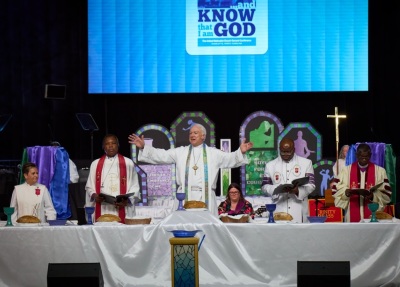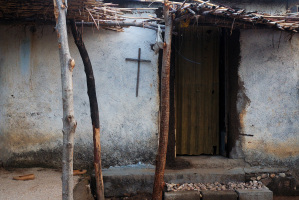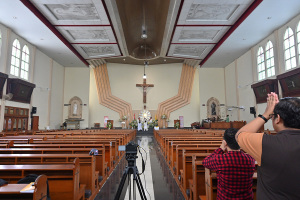1 million United Methodists exit in 1 day

United Methodism’s largest overseas jurisdiction has voted to quit the denomination in response to the church’s divorcing sex from marriage at its governing General Conference earlier this month.
The United Methodist Church in the Ivory Coast voted on May 28 to exit the denomination. In 2022, this conference reportedly had over 1.2 million members. So, its departure means over one tenth of United Methodism has in one day left the denomination. Oddly, United Methodist News Service reported the vote very briefly in an emailed news digest but as of today has no article on its website. Perhaps it will post a fuller account later.
A European website, La Croix International, offers a fuller account:
“For reasons of conscience before God and His word, the supreme authority in matters of faith and life,” the annual conference of the United Methodist Church of Ivory Coast (EMUCI, Eglise Méthodiste Unie Côte d’Ivoire), gathered for an extraordinary session on May 28 in Abidjan, and decided “to leave the United Methodist Church denomination.”
The Ivorian United Methodists said United Methodism “deviates from the Holy Scriptures” and prefers “to sacrifice its honor and integrity to honor the LGBTQ community.”
La Croix International quoted Bishop Benjamin Boni saying “the United Methodist Church now rests on socio-cultural values that have consumed its doctrinal and disciplinary integrity.”
Here’s the text of the Ivorian resolution.
Amazingly, as shared in this video, the decision-making process for the Ivorian Methodists transpired over only a couple of weeks after the United Methodist General Conference concluded on May 3 in Charlotte, North Carolina. At that General Conference, delegates removed the church’s longtime stance that sex is only for marriage between husband and wife. Adultery and extramarital sex were removed as chargeable offenses for clergy, along with homosexual behavior.
The quickness of the Ivorian exit may inspire other United Methodist regions in Africa to act likewise. United Methodism in Africa is overwhelmingly conservative and displeased with United Methodism’s new direction set by the recent General Conference. African delegates at the General Conference were widely ignored and already underrepresented, thanks to an unfair representation formula. Plus, over 70-90 delegates, at least one quarter, and perhaps one-third, failed to get U.S. visas.
Some African delegates unsuccessfully urged the General Conference to establish a process for their exit, as there had been for U.S. churches 2019-2023. But unlike in the U.S., most African nations don’t have clear laws giving the denomination clear ownership of church buildings. If an entire overseas conference votes to exit, there’s little to nothing that U.S.-based church officials can do.
Ivorian Methodism is different from United Methodism elsewhere in Africa because it originated with British Methodism. It gained independence in the 1980s and joined United Methodism in 2004. Now it returns to its previous independence.
There are between 7 million and over 4 million United Methodists in Africa. In 2022, United Methodism reported nearly 7 million members in Africa, where the church often grows by several hundred thousand members annually. This number included 1.3 million in Ivory Coast. But now United Methodism reports 4.6 million members overseas with no explanation of the discrepancy. The recent United Methodist News Service report about Ivory Coast’s exit assigns it one million members.
United Methodism now reports 5.4 million members in the U.S., presumably based on 2022 figures. It does not include the full impact of 7,700 exiting churches, which combined with closed churches, included 1.5 million church members. U.S. membership is now likely close to 4 million, with Africans outnumbering Americans.
But likely not for very long, as the impact of the dramatic General Conference liberalization sinks into African churches. Ivory Coast’s example will be instructive for many others. In five years, very probably nearly all of Africa will have exited United Methodism, leaving a rump church of perhaps several million U.S. members.
U.S. progressives at the General Conference were celebratory about their huge victories, even as they approved massive budget cuts reflecting the United Methodist membership decline.
Maybe they should recall Winston Churchill’s warning after the Munich agreement: “And do not suppose that this is the end. This is only the beginning of the reckoning. This is only the first sip, the first foretaste of a bitter cup which will be proffered to us year by year unless by a supreme recovery of moral health and martial vigour…”
Only divine intervention could restore United Methodism to moral health and martial vigor. In the new age of post-denominational America, likely United Methodism, with other denominations, will not meaningfully exist as a national body in 10 years. But Methodism in Africa, in whatever format, will continue to thrive.
Originally published at Juicy Ecumenism.
Mark Tooley became president of the Institute on Religion and Democracy (IRD) in 2009. He joined IRD in 1994 to found its United Methodist committee (UMAction). He is also editor of IRD’s foreign policy and national security journal, Providence.




























